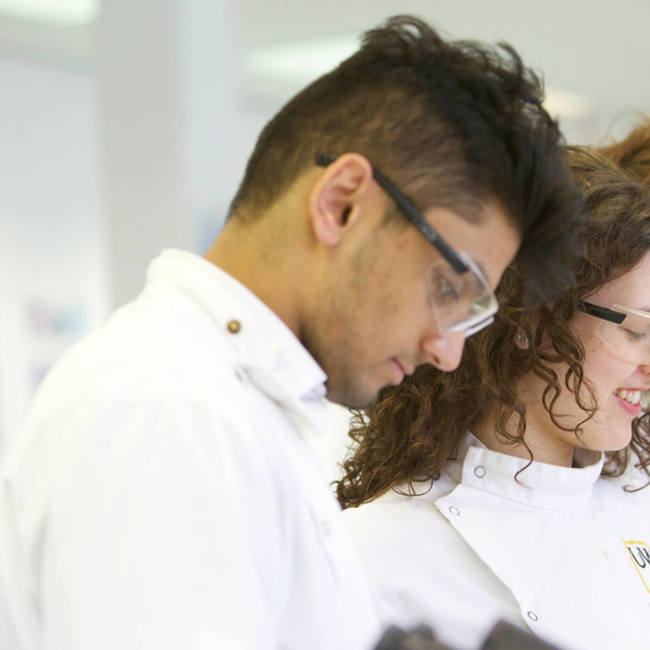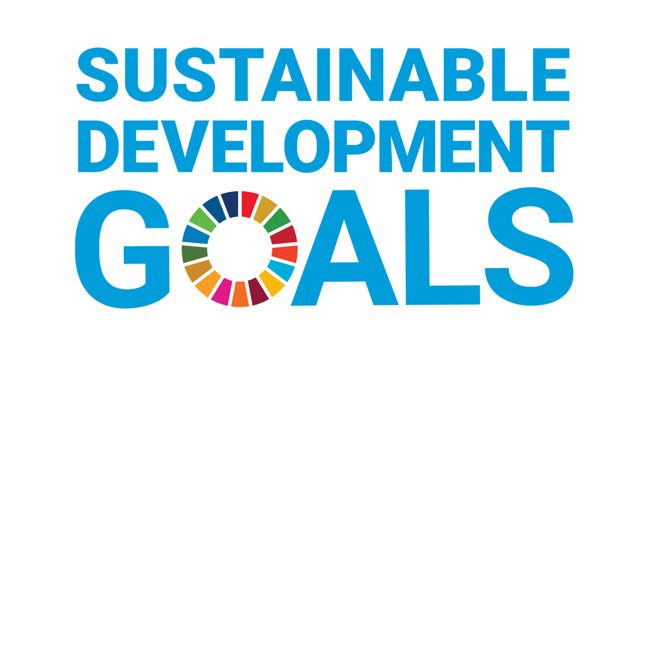Biotechnology
Award
MSc
Duration & study mode
1 year full-time / 2 years part-time*
School
Health & Life Sciences
Location
Lanarkshire
Additional information
Course starting dates
-
Lanarkshire: January, September

The MSc Biotechnology / Biotechnology (Professional Practice) equips you for a career in the fact-moving biotechnology and life science industries or prepares you to progress your studies to academic research (PhD study).
Designed and delivered with industry input, the MSc will develop your knowledge and understanding of a range of theoretical and practical skills relevant to the biotechnology industry, advance your understanding of the industry and grow your research skills.
An appreciation of the principles of commercialisation in the biotechnology industry will be developed through guest speakers from the bio-industry.
You will develop practical laboratory skills throughout your studies in areas such as molecular biology, microbiology, cell culture and bioanalysis.
Modules developing your skills as a researcher will underpin the MSc research project, which allows you to gain extensive practical experience in a research laboratory environment.

*MSc Biotechnology (Professional Practice) typically requires an additional 3 months of full-time study and equivalent part-time study.

This programme aligns to the following UN Sustainable Development Goals:
We welcome Scottish, UK and international students and consider all applicants on an individual basis.
Don’t worry if your qualifications are not listed here, we take a range of factors into account when assessing your application and are happy to consider other alternative combinations of qualifications and experience
If you are applying with an EU or non-EU qualification, please check our Postgraduate Entry Requirements page which gives more information about country-specific entry requirements.
Non-EU students can also undertake our pre-sessional English course over one trimester at the beginning of the course which would allow the MSc to be completed full-time over two years.
You must have gained a second class (minimum 2:2) BSc (Hons) in Bioscience, Biotechnology or a related science degree.
You may also be considered with other academic, vocational or professional qualifications deemed to be equivalent.
All academic degrees/awards at UWS are taught in English. For applicants whose first language is not English*, the University sets a minimum English Language proficiency level. All English language qualifications must have been gained within two years of the start of your UWS course.
* applicants who are exempt from english language requirements include:
In general terms, if you are applying to study a course at, or above, Year 1 (SCQF Level 7) bachelor’s degree level, then the UKVI’s minimum level of English proficiency is Common European Framework for References of Languages (CEFR) at B2 (Upper Intermediate).
At UWS, we define our general English language requirements using the International English Language Testing System (IELTS) Academic module (not General Training) as follows:
These are minimum requirements and some courses may require a higher standard for admission†.
† Exceptions to this level of IELTS scoring exist for some accredited or professionally-recognised courses (see IELTS Score Exceptions section below for more information).
For our research degrees (MRes, MPhil, PhD, DBA, DProf) applicants are required to have an IELTS score as follows:
For Health, Nursing & Midwifery courses that lead to professional registration with the Nursing & Midwifery Council (BSc Adult Nursing, MSc Adult Nursing, BSc Mental Health Nursing, MSc Mental Health Nursing, BSc Midwifery and MSc Midwifery), applicants are required to have an IELTS score as follows:
Our BSc Paramedic Science degree leads to professional registration with the Health and Care Professions Council (HCPC); it has different IELTS requirements than other Health-related courses. Although it is not possible to apply for this degree directly as an international student, for applicants who meet SAAS residency requirements and for whom English is not their first language, then the following IELTS scores are required:
For our BSc (Hons) Applied Biomedical Science, BSc (Hons) Biomedical Science and MSc Advanced Biomedical Science degrees, which may lead to professional registration with the Health and Care Professions Council (HCPC), applicants are required to have an IELTS score as follows:
Our BA (Hons) Social Work and MSc Social Work degrees are professionally recognised by the Scottish Social Services Council and applicants are required to have an IELTS score as follows:
For our Certificate of Higher Education courses, applicants are required to have an IELTS score as follows:
In additional to IELTS, we also accept a number of alternative English language for application and admission to our courses for both home/EU and international students at bachelor's degree study at Year 3 (SCQF Level 9), and above. From Cambridge to TOFEL iBT qualifications the number of these qualifications is extensive.
Find out about non-IELTS English Language Tests
UWS has also reviewed a range of High / Secondary School qualifications studied by non-EU applicants that can be used as a basis of entry to a UWS. These range from Botswana GCSEs to USA High School Graduation Diplomas, the number of these qualifications is extensive.
Find out more about international English Language high-hchool qualifications
Applicants who do not meet the minimum English language requirements have the option to study one of our preparatory and pre-sessional English courses. The UWS courses available are:
This programme opened up opportunities for higher study. The course content and practical training made me confident enough to do research and teaching on advanced reproductive biotechnology. While studying at UWS, I was given the opportunity to do a PhD at Kyushu University in Japan on a Japanese Government Scholarship. Now I am a postdoctoral research associate at the University of Kansas Medical Centre, conducting research on female reproductive physiology, i.e. placental biology.
Md. Rashedul Islam, PhD, MSc Biotechnology graduate
MSc Biotechnology offers current theory and practical skills in a range of relevant techniques including microbiology, immunology, and cell culture.
It is delivered across three terms (full-time - longer on prt-time basis) and contains a mixture of theory and practice core modules. There is flexibility in the sequence of module completion depending on when you commence your studies (September or January).
For the full-time award, there are two terms of three taught modules (each being 60 credits of taught modules) delivered in both terms 1 & 2 plus a 60-credit experimental research project module delivered during term 3.
For the MSc Biotechnology, you will study the following core modules:
Successful completion of the above modules results in the award of MSc Biotechnology.
For those students seeking to undertake the Professional Practice element they would undertake the following core module over one additional term (full-time) following completion of the MSc:
Successfully completing this module plus the MSc results in the award of MSc Biotechnology (Professional Practice).
A variety of teaching methods will be used to ensure that you remain engaged, motivated and challenged to learn. This will include:
Assessment across our course will require you to use various forms of written and oral presentation appropriate to a professional scientist. This will include:
Programme Specification and Module Descriptors for Undergraduate and Postgraduate courses are available to download (PDFs). These provide you with core information concerning your chosen subject.
£7,500 Total cost of tuition
£11,750 Total cost of tuition
£11,750 Total cost of tuition
£18,000 Total cost of tuition
£1,070 per module (20 credits)
£1,680 per module (20 credits)
£1,680 per module (20 credits)
£2,570 per module (20 credits)
£9,500 Total cost of tuition
£11,750 Total cost of tuition
£11,750 Total cost of tuition
£21,250 Total cost of tuition
£1,360 per module (20 credits)
£1,680 per module (20 credits)
£1,680 per module (20 credits)
£3,035 per module (20 credits)
Student Awards Agency Scotland (SAAS) postgraduate tuition fee and living cost loans may be available for eligible (Scottish/EU) students. Check SAAS website for more information.
All students should apply directly to the University through our online application system. Before you apply, you should check that you meet our entry requirements and you should have all your supporting documents ready.
The first stage of the process is to complete the initial application form. You will then receive a follow-up email with further instructions relating to your application including documents that you will need to forward to support your application, e.g. degree transcripts and certificates etc.
Most courses don't have a formal closing date, but they will close when they are full; apply early to avoid disappointment. There may also be funding deadlines that apply to you.
The Academic Technology Approval Scheme (ATAS) applies to all international students and researchers (apart from exempt nationalities) who are subject to UK immigration control and are intending to study or research at postgraduate level in certain sensitive subjects.
Students and researchers who are nationals of EU countries, the European Economic Area (EEA), Australia, Canada, Japan, New Zealand, Singapore, South Korea, Switzerland or the United States of America do not need an ATAS certificate.
An ATAS certificate may be required for certain taught postgraduate master's degrees for international students at UWS.
For the latest information on ATAS and details of eligibility and how to apply for a certificate check the UK Government's dedicated ATAS web pages.
Do you have a question about applying for this course? Get in touch. We are here to help!
We will always try to make sure that we publish accurate course information but we do not accept responsibility for any mistakes or omissions. We will also try to make sure that we deliver our courses in line with our published information. However, we may not always be able to do so and you can find further information about this in our enrolment terms and conditions.